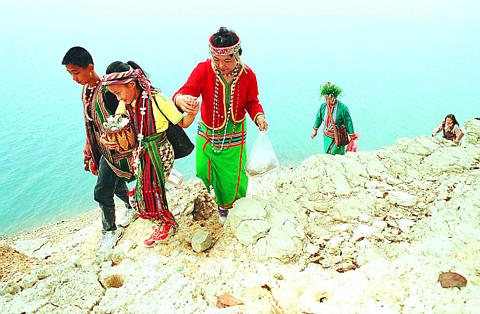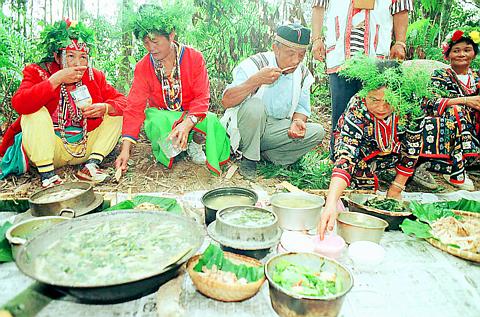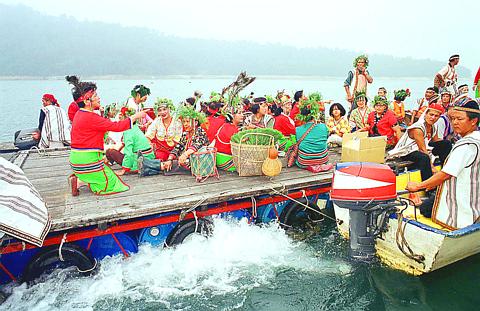Wearing traditional costumes and performing age-old rituals, nearly 200 Aboriginal people from the Thao tribe -- the smallest Abo-riginal group on the island -- returned to their ancestral land yesterday, celebrating what they described as a "rebirth" of their tribal culture.
Women sang loudly together with tears in their eyes. They sprinkled rice wine on the ground to inform the gods of their arrival.
"After 50 years of fighting, we are finally returning to our own land," said one Thao.

PHOTO GEORGE TSORNG, TAIPEI TIMES
Since the Japanese occupa-tion, the Thao have lived in the Tehua community area on the shore of Sun Moon Lake, near the epicenter of the devastating 921 earthquake. The quake destroyed most of the hotels and tourist spots around the lake and also caused serious damage to the Thao community at Tehua. At least 180 houses in the village collapsed, 95 percent of which belonged to the Thaos. Most of the tribe's 283 members have also been left unemployed by the quake.
This, they said yesterday, was the main reason for the "land-return" ceremony. They said now that their homes were destroyed, they are now going back to where their roots are.
The ceremony took place in a religious as well as political atmosphere. Garlands were placed on the heads of the 200 villagers. Then, singing together, they took a raft across a small bay out onto a nearby peninsula -- called Puzi -- that is their traditional homeland. After the 10 minute ride from the Tehua community, shouts and cheers went up as they landed. "Piakalinkin!" they shouted, meaning peace and safety.

PHOTO GEORGE TSORNG, TAIPEI TIMES
"We Thao people like to be close to nature. That's why we wear garlands on our heads," said Mani, a Thao woman in her 60s.
Fifty years ago, the tribe -- which numbered around 900 at that time -- lived in an area on the southern shore of Sun Moon Lake they call Puzi -- the Thao word for `white.' For two hundred years the Thao grew rice on the fertile flats, hunting and fishing locally and living quietly isolated from the rest of Taiwan.
But plans by Taiwan's Japanese occupiers to turn the natural lake into a reservoir to feed a hydro-electric plant meant much of the Thao's low-lying homeland would be flooded. The tribe were moved to new land to the south-east of the lake at what is now the Tehua community. They were not given any choice in the matter. Generations later, their traditional tribal culture has been diluted by Taiwanese and Chinese culture, and their population reduced to only 283.

PHOTO GEORGE TSORNG, TAIPEI TIMES
When the KMT "liberated" Taiwan, they moved into the area, developing the lake into what is now the island's most popular tourist destination.
"They [the KMT government] let the Han [Taiwanese] move here and integrate with our people," said Panu Kapamumu, the director of the Association for the Cultural Development for Thao People.
Panu believes this was a major step toward the destruction of Thao culture.
"They did not take us seriously, they just wanted us to dance and sing," he said.
Thao is still not recognized as an official Aboriginal tribe by the government, because it was long thought to be a sub-division of the Tsou tribe by anthropologists.
But villagers said the government took advantage of their culture while politically ignoring their status and rights.
The vanishing of their language is a major indicator of this loss of culture, as few people under the age of 45 speak the tribal language anymore.
Panu said yesterday that the ceremony represented "a chance for our people to trace our culture back toward the source."
After arriving at Puzi, senior villagers and spiritualists of the tribe started to identify old defense works and ancestral tombs, reaffirming the connection between the land and the Thao tribe.
"We are planning to resettle here now and restore our culture here," said Panu.
Villagers then started fires and made traditional rice cooking containers from fresh bamboo cut nearby.
With everyone lending a hand, villagers enjoyed the traditional Thao meal and rice wine. They decided to camp on the site, to sleep where their ancestors slept -- to sleep at home again.

The CIA has a message for Chinese government officials worried about their place in Chinese President Xi Jinping’s (習近平) government: Come work with us. The agency released two Mandarin-language videos on social media on Thursday inviting disgruntled officials to contact the CIA. The recruitment videos posted on YouTube and X racked up more than 5 million views combined in their first day. The outreach comes as CIA Director John Ratcliffe has vowed to boost the agency’s use of intelligence from human sources and its focus on China, which has recently targeted US officials with its own espionage operations. The videos are “aimed at

STEADFAST FRIEND: The bills encourage increased Taiwan-US engagement and address China’s distortion of UN Resolution 2758 to isolate Taiwan internationally The Presidential Office yesterday thanked the US House of Representatives for unanimously passing two Taiwan-related bills highlighting its solid support for Taiwan’s democracy and global participation, and for deepening bilateral relations. One of the bills, the Taiwan Assurance Implementation Act, requires the US Department of State to periodically review its guidelines for engagement with Taiwan, and report to the US Congress on the guidelines and plans to lift self-imposed limitations on US-Taiwan engagement. The other bill is the Taiwan International Solidarity Act, which clarifies that UN Resolution 2758 does not address the issue of the representation of Taiwan or its people in

US Indo-Pacific Commander Admiral Samuel Paparo on Friday expressed concern over the rate at which China is diversifying its military exercises, the Financial Times (FT) reported on Saturday. “The rates of change on the depth and breadth of their exercises is the one non-linear effect that I’ve seen in the last year that wakes me up at night or keeps me up at night,” Paparo was quoted by FT as saying while attending the annual Sedona Forum at the McCain Institute in Arizona. Paparo also expressed concern over the speed with which China was expanding its military. While the US

SHIFT: Taiwan’s better-than-expected first-quarter GDP and signs of weakness in the US have driven global capital back to emerging markets, the central bank head said The central bank yesterday blamed market speculation for the steep rise in the local currency, and urged exporters and financial institutions to stay calm and stop panic sell-offs to avoid hurting their own profitability. The nation’s top monetary policymaker said that it would step in, if necessary, to maintain order and stability in the foreign exchange market. The remarks came as the NT dollar yesterday closed up NT$0.919 to NT$30.145 against the US dollar in Taipei trading, after rising as high as NT$29.59 in intraday trading. The local currency has surged 5.85 percent against the greenback over the past two sessions, central